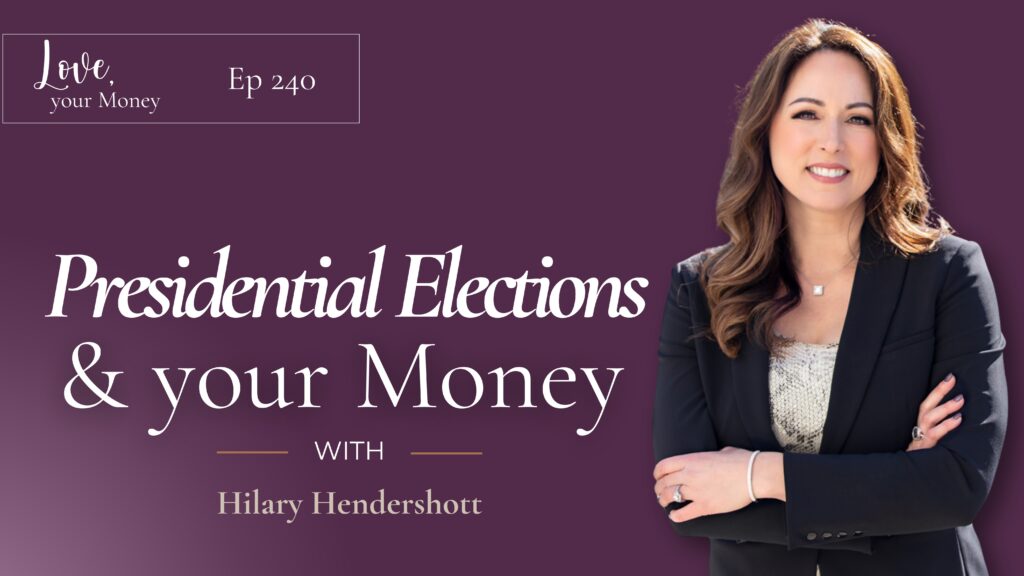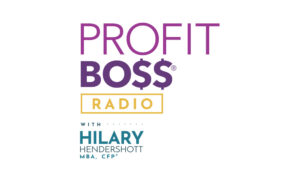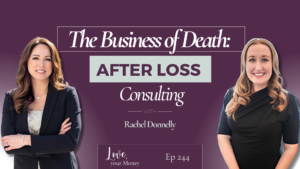Money and anxiety don’t go well together, but news headlines like to pair them up because, let’s be honest, hitting your emotional triggers is good for their bottom line.
Well, here’s some good news: You don’t have to fall for clickbait, and learning how to stay the course instead of reacting to their hot takes is good for *your* bottom line.
In this episode, I’m going to provide a light in the darkness with clear, level-headed, stay-sane advice to help you navigate the unknowns of external events–political, environmental, or otherwise–so you can ditch the anxiety and watch your wealth grow with ease.
And when could we possibly need that assurance more than with the current conversations about national politics? It’s a hot and timely topic right now, as Americans stare down a repeated match up at the polls in November.
Now, I’m not here to take a political position. I *am* here to talk about the potential impact of election cycles and other major world news on your investment portfolios. Before you listen to this 15-minute episode, know this: It’s not as dire as you might think.
Listen in to demystify the effect of elections on the markets, and get insights into strategies to safeguard your investment portfolio in potentially uncertain times.
Here’s what you’ll find out in this week’s episode of Love, your Money:
- How geopolitical risks—like wars, elections, and economic sanctions—have historically already been priced into markets, and what that means for your investments today,
- Why we can count on predictable resilience of markets through global events,
- How return follows risk, and when (and how) you might consider reducing your risk exposure,
- A smart way to evaluate whether a certain stock is a good bet for your portfolio, and
- What the research (and our experience) indicates is key to a stable growth trajectory in your investments over the long term.
We hope you walk away with the confidence that comes from knowing your money, future, and legacy are safe and secure–despite what the headlines might say.
Inspiring Quotes and Words to Remember
“Geopolitical risks are already priced into markets… to the extent the global community of investors, who are very smart collectively, is pessimistic about things, relevant stock prices have already fallen. To the extent the global community of investors is optimistic about such things, stock prices have already risen.”
– Hilary Hendershott
“The bad news is you can’t trade on your hunches. The good news is you can’t trade on your hunches.”
– Hilary Hendershott
“When you hear news that makes you think the sky is falling, remember that the investment markets already know.”
– Hilary Hendershott
“I always say stocks are the only thing Americans don’t like to buy on sale.”
– Hilary Hendershott
“The basic moral of the story is don’t worry. Diversify.”
– Hilary Hendershott
Resources and Related to Love, your Money Content
- Kenneth R. French Data Library
- Follow Hilary on Facebook | Instagram | LinkedIn | YouTube
- Learn more about how to take care of your money (so it can take care of you!) by signing up for Money Love Notes.
You’ll get exclusive insights from Hilary about the podcast, reflections on what’s happening in the world of money, and strategies for wealth building that will help you become rich(er).
Enjoy the Show?
- Be sure to subscribe to Money Love Notes so that you get our latest announcements, offers, articles, and resources straight to your inbox!
- Don’t miss an episode, subscribe via Apple Podcasts, Spotify, Google Podcasts, Overcast, or wherever you listen!
- Leave us a review on Apple Podcasts and share the show with your friends.
- Don’t miss out on the 7 Steps to Wealth Audio Guide! It’s free and comes with weekly emails that walk you through each step.
Transcript
Hilary Hendershott: Well, hey there, money lover, welcome to Love, your Money, the podcast where we dive deep into the strategies that can help you build and sustain wealth no matter what the world throws your way and love the process. I’m your host, Hilary Hendershott, here to occasionally provide a light in the darkness with clear, level-headed, stay-sane advice.
And what could be more potentially dark than national politics? So, today, we’re going to go ahead and tackle this hot and timely topic. We’re going to talk about the upcoming 2024 presidential election and what it could mean for your investments. No, I’m not going to dig into politics. I’m not going to take a position on that. I’m sure you or the people around you have very clear positions staked out. But this podcast is about you being happy, satisfied, fulfilled, and clearheaded about your money. So, I’m staying apolitical, but we are going to talk about the impact presidential elections historically have had on the stock market and, therefore, your hard-earned savings.
So, if you’re worried about what happens if the other side wins, if you’ve read that you should take your portfolio to cash and sit out the battle… I have just what you need to hear today. So, listen in and stay tuned.
Clearly, you know at this point that both major parties are gearing up for a showdown, and it does look like we’re going to be presented the same two candidates we’ve seen before. How about that? So, while we’re not getting new blood, clearly, the media will be ginning up new drama. Why? Because that’s what they do.
Today, I want to help you put on some blinders, at least when it comes to your money. I can completely understand why you’d be feeling a little uneasy about the presidential election and your hard-earned savings. Anxiety and money don’t go super well together, though. So, today, we’ll demystify how elections impact the markets and discuss strategies to safeguard your portfolio in these potentially uncertain times.
Let’s start by talking about geopolitical risks. The term, geopolitical risks, refers to how global events, like wars, elections, and economic sanctions impact financial markets. And my main message here is that, counterintuitive though it is, geopolitical risks are already priced into markets.
What that means is that to the extent the global community of investors, who are very smart collectively, is pessimistic about things, events, likely happenings, relevant stock prices have already fallen. To the extent the global community of investors is optimistic about such things, stock prices have already risen.
In other words, what’s coming up on deck are not new scenarios. Our markets have seen world wars, regional conflicts, and even political upheavals and have continuously evolved to factor these risks into pricing.
What does that mean to you? Well, it means there is no investment-related action for you to take. Just because you know that eventually the conflict in Palestine will eventually have a resolution, and that resolution may impact a region or a company, trading on that bet about that outcome is a really silly thing to do. I’m not saying it’s not intuitive, and I’m not saying you’re not going to hear from the media that you should do it. You likely will hear those things. But I’m here as your voice of reason to remind you that markets price in known events, upcoming events, yes, events that haven’t happened yet, but events we know are on deck or are likely to happen instantaneously.
In fact, tens of thousands of investors have already beat you to the punch, and you placing your bet late is not a good use of your time or funds. That is the nature of what we call efficiently-priced markets. The bad news is you can’t trade on your hunches. The good news is you can’t trade on your hunches. And this lesson that global investor sentiment is priced into your stock portfolio almost instantaneously is actually applicable to every aspect of investing, including new trends and technologies, new products, new disruptive companies, new changes in consumer demand and behavior, and yes, presidential elections.
Historically, markets are surprisingly, shockingly maybe, resilient. Well, actually, they are predictably resilient because they bounce back after every global event that’s happened. That’s right. The world wars, the dot-com bust, the Great Recession, COVID, and many, many more, markets adjust and recover from shocks over time. That’s because markets are forward looking and price in risks long before we read about them in the headlines. So, when you hear news that makes you think the sky is falling, remember that the investment markets already know.
But here’s a question to ponder: Setting aside the buzz around the upcoming election, are you comfortable with the historical risks that your investments have faced? This is really the vital question because if the answer is no, you might be in for a stressful time, election or not. If you’re feeling uncertain, it might be a good time to schedule a conversation with a comprehensive, holistic, fiduciary financial advisor. Together, what you can do with that person is review the overall risk profile of your portfolio. If you’re not comfortable with swings in your portfolio, you might want to increase your exposure, which is just a way of saying how much you’re invested in, to assets that have lower risks than stocks.
The most common of these and easy to buy is bonds. Of course, you do have to remember that rewards—meaning returns—follow risks. Returns follow risk. So, you can’t achieve the highest long-term expected returns without exposure to stocks. I find that the vast majority of my clients are comfortable with staying the course after experiencing a full market cycle together. It’s a lot like going to the gym to build muscle. You lift and the next day, you hurt. That’s the pain of having broken down your muscle cells, and it’s akin to the pain of watching your stock portfolio occasionally dip.
Muscle pain is not why you go to the gym, but it is a part of the process because within a few days, that pain goes away and the new, bigger, prettier, better toned muscles show up. In the stock market, maybe it takes a little bit more time than muscles, but eventually, those dips turn into peaks that exceed previous account balances. And now that you’ve gotten comfortable with that cycle, the next time it happens, you just don’t have to be as anxious.
All right, let’s get to the point, Hilary. What does the data say about what happens in the stock market around the time of presidential elections? Well, research from the Ken French Data Library, which includes decades of US stock return data, shows us that there’s no consistent pattern of stock market performance following a presidential election. We have absolutely no historical evidence that the market can be expected to react in any particular way, whether it’s a Democrat or a Republican that takes office. The stock market is actually far more driven by broader economic policies and global market conditions than who sits in the Oval Office.
I know that might take a minute to really wrap your brain around because it’s not what the candidates say and it’s not what the media says, and it’s often not what Wall Street says, but that’s the evidence-based truth. What’s really interesting is that the data tells us that what matters more than who gets elected is the policies that come into play during a president’s term. These policies around things like taxation, trade, and regulation can influence economic growth, inflation, and other key economic indicators.
But remember, markets are anticipatory. Like I said earlier, they are forward looking. They react to expectations about how these policies will play out in the long run, often before the policies are implemented. Regardless of who’s in power, I do believe that one of the biggest long-term economic challenges is the government’s growing size. As you probably know, Republicans and Democrats are divided on how to address our growing debt. And if debt isn’t good in your finances and you know it’s not, of course, it isn’t good in our public finances because it is likely to lead to slower economic growth.
Globally speaking, though, the US is better positioned than most even developed countries and should be more resilient to fiscal risks. That said, I don’t recommend having your investments all in the US. You want to diversify globally. That is not an individual stock market recommendation. As an investor, I recommend that rather than thinking about political and economic risks, you keep your attention on how a company’s stock price compares to the earnings it generates. In other words, how expensive is that company compared to what it’s actually producing for you?
Currently, if you make that comparison in a US stock market, what we know is that US stocks are pretty expensive for the earnings that they generate. US stocks have had more than a handful of banner years, and you wouldn’t run out and buy something for your home or your wardrobe if you knew the store was charging twice its retail value. But for some reason, people like to do that with stocks. I always say stocks are the only thing Americans don’t like to buy on sale.
But the good news here is that international stocks and emerging market stocks are relatively close to historical valuation levels. AKA, buy the thing at the retail price or below it, please. Even in the US stock market, while large company stocks are priced high, smaller and more value-oriented companies have valuations close to historical average, which could offer more attractive opportunities to buy in. That’s as technical as I’m going to get today, so don’t stop listening yet.
The main message here is that it is important to diversify and avoid the temptation to chase the highest returns of last quarter. During election years, it really is common to see shifts in what the media is covering, the drama of the day, and even the terrifying planned policies of the candidate you don’t support. Tech stocks might react differently from utility stocks based on proposed regulatory changes. So, by diversifying your portfolio across different sectors, geographical regions, and asset classes, including stocks and bonds, you can buffer against these potentially negative outcomes.
For my clients, we hold a broad mix in their portfolios, including international stocks, small to mid-cap stocks, and high-quality bonds along with their large cap stocks. And research indicates that this diversification can provide a more stable growth trajectory. Diversification, the concept of diversification, doesn’t just include buying lots of different things, it also includes time diversification, in other words, being invested in this time period, the next time period, and the ones after that. It’s important to remember that investing really is a long-term game.
Market dips and swings can be smoother over a longer period, so keep a long-term perspective. That really is crucial, especially during election cycles, which tend to heighten emotional reactions. That’s really my communication for you today. Thank you for tuning in to today’s episode of Love, your Money. I hope you’ve learned something in this discussion on how the 2024 presidential election can impact your financial portfolio.
The basic moral of the story is don’t worry. Diversify. We’ve covered a lot of ground from how geopolitical risks are already priced into the markets, to why the outcomes of elections probably don’t impact the markets as much as you think, to how to evaluate current market valuations, and finally—and to reiterate—the importance of diversification. Remember, no one can predict the future, not a politician, not the media. But being informed and prepared can help you navigate through it with confidence.
If you’re feeling unsure about your investment strategy or how to proceed in these uncertain times, consider reaching out to my firm for a friendly chat or a second opinion. No cost or obligation. Just fill out our contact form at HendershottWealth.com/contact. Don’t forget to subscribe to the podcast for more insights on how you can manage your finances wisely and effectively. Until next time, keep your investments smart and your future brighter.
Disclosure
Hendershott Wealth Management, LLC and Love, your Money do not make specific investment recommendations on Love, your Money or in any public media. Any specific mentions of funds or investments are strictly for illustrative purposes only and should not be taken as investment advice or acted upon by individual investors. The opinions expressed in this episode are those of Hilary Hendershott, CFP®, MBA.





